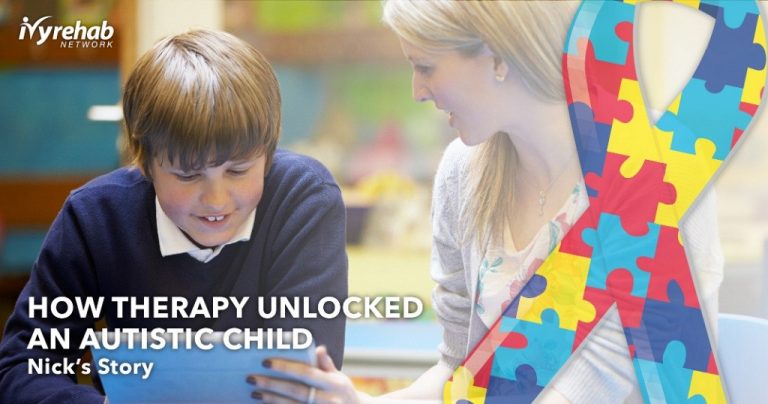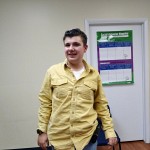
Nick’s Story – How Therapy Unlocked a Family’s Autistic Child
When Sheri Naumovic of Virginia Beach brought her autistic son, Nick, to Ivy Rehab’s Southeastern Therapy for Kids clinic, she had a gut feeling he knew more than he was letting on. She was also near her wit’s end. Nick had been in speech and occupational therapy since his regressive autism diagnosis at 3 years old. By age 14, Nick had a total of 16 therapists at another agency. No one could seem to make a connection or find a way to motivate him. The family stopped therapy out of frustration.
“It was discouraging to us and for him,” Sheri said. “He is very eager to please and wants to do well. I think it had an effect on his self-esteem and is one of the reasons why it took him so long to open up.”
The Last Hope for their Autistic Child
Sheri decided to try Southeastern Therapy for Kids at the recommendation of Nick’s pediatrician. Nick, then 14 years old, worked with two speech-language pathologists there before being partnered with Brittany Mowfy, MS.Ed. CCC-SLP, now the clinic’s director. According to Mowfy, he had a diagnosis of autism, apraxia of speech, and global apraxia.
“I believe he knows a lot more than he is letting on and is playing us,” Sheri wrote later in a letter to acknowledge Mowfy for her transformational presence in Nick’s life. “Well, if you know Brittany you can see her putting a hand on her hip, looking at Nick and saying, ‘So you like to play, well let’s play.’ I will never forget that day because I knew something special was about to happen.”
Nick’s Journey with Autism
As a toddler, Nick stopped making eye contact and lost his ability to talk. His school deemed him mentally retarded and placed him in classes with other autistic children, but he had an iPad and knew how to use it to search the Internet and YouTube. A psychiatrist believed he could read and encouraged the Naumovics to use subtitles on the television. As he grew older, his parents weren’t really sure of his comprehension level and therapists couldn’t make a breakthrough. That is, until Mowfy.
The Breakthrough – unlocking the mind of an autistic child
Nick showed immediate improvement as soon as he started working with Mowfy but still struggled to communicate. Within sixth months, Nick’s parents learned he could do math, follows soccer, knows multiple alphabets and understands several languages. And it all came thanks to Mowfy’s persistence and an iPad with communication software.
One day, Sheri decided to bring in the school-issued iPad to see if Mowfy could get him to use it. Nick carried the iPad all day for three years, but Sheri would check the history and it was always empty. “I brought it in with a heavy heart thinking nothing is going to come from this,” she said. “…We thought he didn’t understand anything and talked like he wasn’t even there. Come to find out he understood everything we said.”
She remembers the date all their lives changed: March 3, 2017. Within 30 minutes, Mowfy returned with a video of not only Nick using the device but doing math.
“I cried, as did his father, and it became the first of many happiest days of our life,” Sheri wrote in a thank you letter. “We are no longer concerned with Nick’s future, and we can with all certainty tell you that Mrs. Mowfy was the key that opened the door where he had been stockpiling all of his knowledge.”
Incredible Progress in Communication
With each therapy session, Mowfy started asking him questions and he started answering through the iPad using the communication software. “That is what allowed me to get him communicating at a higher level,” Mowfy said. “We did that math, and he saw he could communicate. We very quickly progressed through tons of math, talking to each other, recalling stories. We do all of these things with the device.”
Mowfy’s sessions opened the floodgates. He started reading articles, asking and answering all kinds of questions, and doing schoolwork. The family started documenting Nick’s speech sessions with Mowfy using the communication software and uploading them to YouTube. Sheri also started homeschooling Nick, and he works with two tutors. He sees Mowfy twice a week and goes for voice and occupational therapy, so they are at the clinic five days per week.
Acceleration and a Few Surprises Along the Way
Nick, now 16 years old, wanted to use his iPhone so they loaded the Proloquo2Go app on his phone. As part of Mowfy’s therapy, they visit stores and Nick orders and talks to people through the device. They practice shopping or how to communicate if he was lost.
Sheri said Nick listens to Mowfy and wants to perform and succeed. She makes him feel capable instead of someone who belongs in special ed. “She is resilient. She kept pushing him and talking to him, trying to build his self-esteem,” Sheri said. “She didn’t treat him like someone disabled, like an autistic child. She talked to him just like she would talk to anyone else. I think that made him feel normal. He’s been coddled all his life and talked down to.”
Mowfy, who has a degree in psychology, echoes those sentiments. She credits Nick’s transformation to building trust and rapport, challenging him, and getting him to open up about what all he knew. For example, he can translate English, Spanish, and Mandarin Chinese through his device even though he can’t say it or write it.
“I had the curiosity to test him and see what he really knew and continue to challenge him,” Mowfy said. “I am very honest with him. I talk to him like he is 16 because he is.” She asked how he knew math because she didn’t teach it to him and he didn’t learn it in school. He told her he learned it from reading his father’s books when he was younger.
“If you feel like you can’t communicate, there’s that shut down that happens,” Mowfy said. “The schools didn’t have the tools to reach him and encourage him in a way to want to perform.”
Treating an autistic child requires a multidisciplinary approach
They continue to work on his verbal communication along with using the device. Right now, he can say yes and no. Their next therapy goal is to get him to speak 25 or 50 words so he could communicate with the police and others.
Mowfy also credits the other therapists for working together to do activities that cross over into other therapies. They work on skills that will help Nick function like a young man, gain independence, and continue to improve his cognitive abilities. That includes communication, social skills, feeding and swallowing, typing and writing, and voice therapy.
“The schools are great, but in private practice, we have a great benefit to really cater to the family and also to the patient,” Mowfy said. “We have so many options that we can tag team and pull together and give a family that full support system.”
The Naumovics feel the sky is the limit for their son. He said he wants to be a pediatrician to help other children like him. “There’s no rush,” Sheri said. “One of our primary care physicians at 50 years old stopped being a carpenter and went to school to be a physician. He’s not restricted on a timeframe.”
Nick often tells his mom: “Never give up and don’t treat me differently.”
Never Give Up
In September 2017, Sheri wrote a letter to the clinic’s administration thanking Mowfy for her work and progress with Nick. She also wants to encourage other parents who feel hopeless to keep searching for the right therapy, seeking answers, and advocating for their autistic child. It’s okay to rethink their school situation if it’s not working or get a second opinion on a diagnosis or IQ test.
“We want to give people hope because we were hopeless, we know how it feels,” Sheri said. “Everyone should have the opportunity to see that there is a light, having an autistic child is not a tunnel you cannot emerge from, we now know that.”
We’re Here to Help
Ivy Rehab Network offers a variety of specialized therapies for children, including specialty evaluations and therapeutic interventions. Specialized physical therapists work one-on-one with pediatric patients to address their individual needs, encourage progress, and form meaningful bonds. Whether your child is struggling with speech, fine motor skills, or a complex dual diagnosis, call your local clinic and see how they can help your child blossom.
The medical information contained herein is provided as an information resource only, and does not substitute professional medical advice or consultation with healthcare professionals. This information is not intended to be patient education, does not create any patient-provider relationship, and should not be used as a substitute for professional diagnosis, treatment or medical advice. Please consult with your healthcare provider before making any healthcare decisions or for guidance about a specific medical condition. If you think you have a medical emergency, call your doctor or 911 immediately. IvyRehab Network, Inc. disclaims any and all responsibility, and shall have no liability, for any damages, loss, injury or liability whatsoever suffered as a result of your reliance on the information contained herein.
